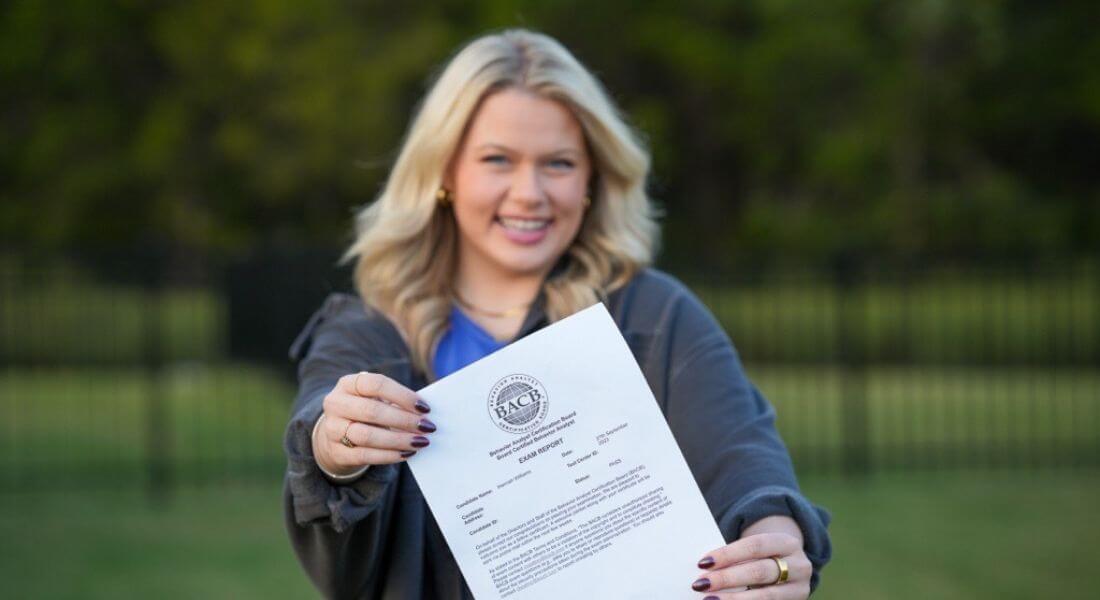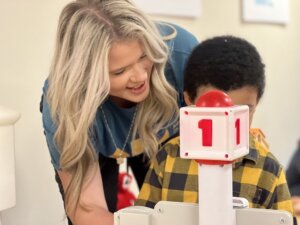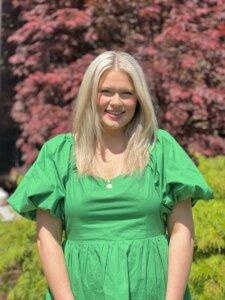From RBT to Fellow to BCBA, Hannah Grows Her Clinical Practice – and her Career – at Hopebridge
March 20, 2024
March 20, 2024

As many board certified behavior analysts (BCBA) know, supervision hours offer more than a requirement to obtain certification. When chosen and acquired thoughtfully, fieldwork can set up a graduate-level student on the right path toward a fulfilling career with confidence.
Still early in her career, this is something Hopebridge’s Hannah Williams has already discovered and is putting to the test, now that she has graduated from the Hopebridge Fellowship Program and is serving our kids and families as a BCBA.
“We learn all about it in school, but the fellowship had me do it. We can study and learn all there is to know about ABA, but if we can’t put it into action, our performance as clinicians is hindered. Connecting everything together is what made my experience,” said Hannah.
Somewhat unlike others in this role, Hannah planned to work in a behavior-related field, even as a young girl. Originally envisioning her dream job as a role within the FBI’s Behavioral Analysis Unit (yes, that “BAU” from the show, “Criminal Minds”!), she was instead introduced to applied behavior analysis (ABA) during an internship during her senior year of high school.

Hannah photographed working at AIM Clinics, now Hopebridge, as an RBT.
It was not long after learning about ABA therapy that she shifted gears and set her sights on a new dream for the future. She became a Registered Behavior Technician (RBT) right out of high school and worked her way through college.
Hannah then found AIM Clinics, and ultimately Hopebridge, when seeking both a new graduate school program and a career with a company that aligned with her values.
“I’m mindful and passionate about staying in touch with research and modifying my goals to be affirming to the autistic community,” said Hannah. “I wanted to make sure I worked with people who were not just treating this community, but truly care about it.”
Hopebridge also checked another box on Hannah’s list of priorities. In addition to its care for the autism community, she felt the provider would also help her grow as a clinician. She joined the Hopebridge Fellowship Program for behavior analysis to extend her learning beyond her master’s program.
Hannah notes that joining the Fellowship Program was a commitment shift. More than just fieldwork, at first it seemed like a lot of hard work. Though it was, as she continued, she realized that due to the opportunities she received within the fellowship, she felt more prepared and competent in her role than other students accruing ours outside of an intensive fellowship experience often feel. She became a mentor among her peers, able to discuss her experience with methodology like functional analysis – such as IISCA – and more, all before she even became a BCBA.

Hannah went to grad school at USF to pursue becoming a BCBA.
“The Fellowship Program led me to be a confident and competent young BCBA, especially as I transitioned from the RBT role. It helped me connect those dots,” said Hannah.
According to Hannah, receiving supervision beyond one BCBA is another Fellowship Program perk. She appreciated connecting with a range of clinicians and their passions, opinions and ways to get to the end goal, as the fellowship facilitated conversations and relationships within her cohort, as well as with BCBAs both in and outside of her center. She likens it to a safety net without fear of failure, as there was a wide net of supervisors who could support her.
“There was always an opportunity to reach out to others, so I didn’t feel like a fish out of water. I never felt alone and it was never uncomfortable to ask someone for help,” said Hannah. “That’s the beauty of a larger company; there’s no shortage of clinicians who are passionate about different topics and discussing the tiny details, procedures and protocols.”
ABA is a science, but there are many different ways one can come to that science. Hannah said the fellowship experience helped her form her own opinions, make them stronger, and sometimes, even change her thought process.
Now, she says it’s game time, as she has her own caseload, kids and families who depend on her. Though she’s confident in her role as a BCBA, she appreciates that the fellowship taught her she can continue to expand upon her own knowledge with support from her colleagues.
Since Hannah graduated, passed the BCBA exam and completed her fellowship, she’s now on the other side mentoring budding clinicians. Since becoming a BCBA, she did an “Ask Me Anything” panel and led her first Journal Club for Hopebridge’s current Fellows.

As a BCBA at Hopebridge, Hannah gets to mentor fellows and new clinicians.
“I have worked in ABA for a good part of my life – 8 years! But I was on the RBT side. The fellowship is what built me to be the clinician I am now,” said Hannah. “I had great supervisors and want to give back to the program that built me.”
As a newer BCBA, Hannah brings a special perspective to the program. There have been some big changes, such as to the BCBA Task List, in recent years, which she feels gives her something different to offer fellowship students than other more tenured behavior analysts are able to give them.
“I was in the trenches right where they were six months ago. The case manager role is tough, and I want to be someone who knows where they are coming from and walk with them as a companion,” said Hannah. “I want to not only give them a mind-growing experience, but also a confidence boost.”
Hannah encourages students considering their next steps in their career to expand their network and make contacts with people of all different passions.
“It’s normal to be drawn to people who are like you. It’s how we are programmed as humans, but I learned and grew the most from people who did things differently than me,” said Hannah. “I gained so much more than I would have if I stayed within my own shell.”
She also says that becoming a “yes” woman helped her develop her skills. Hannah took advantage of every opportunity, from free events to conferences, to access new materials and expand her network.
As a BCBA, Hannah looks forward to the celebrations with families. It’s the moments when a child – whose family was told they would never talk – tells their mom, “I love you.” It’s when a child who would not even cry nor point to communicate begins using augmentative and alternative communication (AAC) and eventually does not want to stop speaking! These moments are what drive Hannah within her work.
“I’m not a parent, but I can imagine what it feels like to have that hope given back to you. It makes the celebrations so much bigger,” said Hannah.
Are you looking for a rewarding career where you can learn and grow, in addition to making a meaningful impact on others? Consider a role at Hopebridge, where you can reach your own goals while helping others achieve theirs at the same time. From the Fellowship Program and RBT Development Program to the BCBA Career Pathway and leadership training, the learning never stops. Check out the open positions with Hopebridge across the country.
*Informed consent was obtained from the participants in this article. This information should not be captured and reused without express permission from Hopebridge, LLC. Testimonials are solicited as part of an open casting call process for testimonials from former client caregivers. Hopebridge does not permit clinical employees to solicit or use testimonials about therapeutic services received from current clients (Ethics Code for Behavior Analysts 5.07-5.08; BACB, 2020). Hopebridge does not provide any incentives, compensation, or renumeration for testimonials provided by a former client or client caregiver.
Team Spotlight
March 09, 2018
How Hopebridge RBT Mikala Tutterrow Expresses Awareness and Passion for Autism
Team Spotlight
August 30, 2022
Advocacy in Action: Hopebridge BCBA Kira Witte Builds Community Through Baseball
Team Spotlight
June 08, 2018
Stephanie Ramos – A Hopebridge SLP Finds Passion Working with Kiddos
Team Spotlight
June 06, 2022
Since 2005: Making ABA Therapy Accessible for Thousands of Families